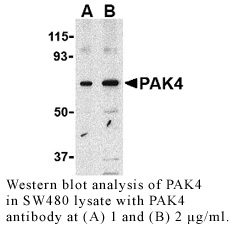Anti-Human P21-Activated Kinase 4 (PAK4)
Product Code:
LEI-P193
LEI-P193
Host Type:
Rabbit
Rabbit
Antibody Clonality:
Polyclonal
Polyclonal
Regulatory Status:
RUO
RUO
Target Species:
Human
Human
Applications:
- Immunohistochemistry- Paraffin Embedded (IHC-P)
- Western Blot (WB)
Shipping:
Ambient
Ambient
Storage:
This polyclonal antibody is stable for at least one week when stored at 2-8°C. For long term storage aliquot in working volumes without diluting and store at -20°C in a manual defrost freezer. Avoid Repeated Freeze Thaw Cycles.
This polyclonal antibody is stable for at least one week when stored at 2-8°C. For long term storage aliquot in working volumes without diluting and store at -20°C in a manual defrost freezer. Avoid Repeated Freeze Thaw Cycles.
No additional charges, what you see is what you pay! *
| Code | Size | Price |
|---|
| LEI-P193-20ug | 20 ug | £199.00 |
Quantity:
| LEI-P193-0.1mg | 0.1 mg | £591.00 |
Quantity:
Prices exclude any Taxes / VAT



